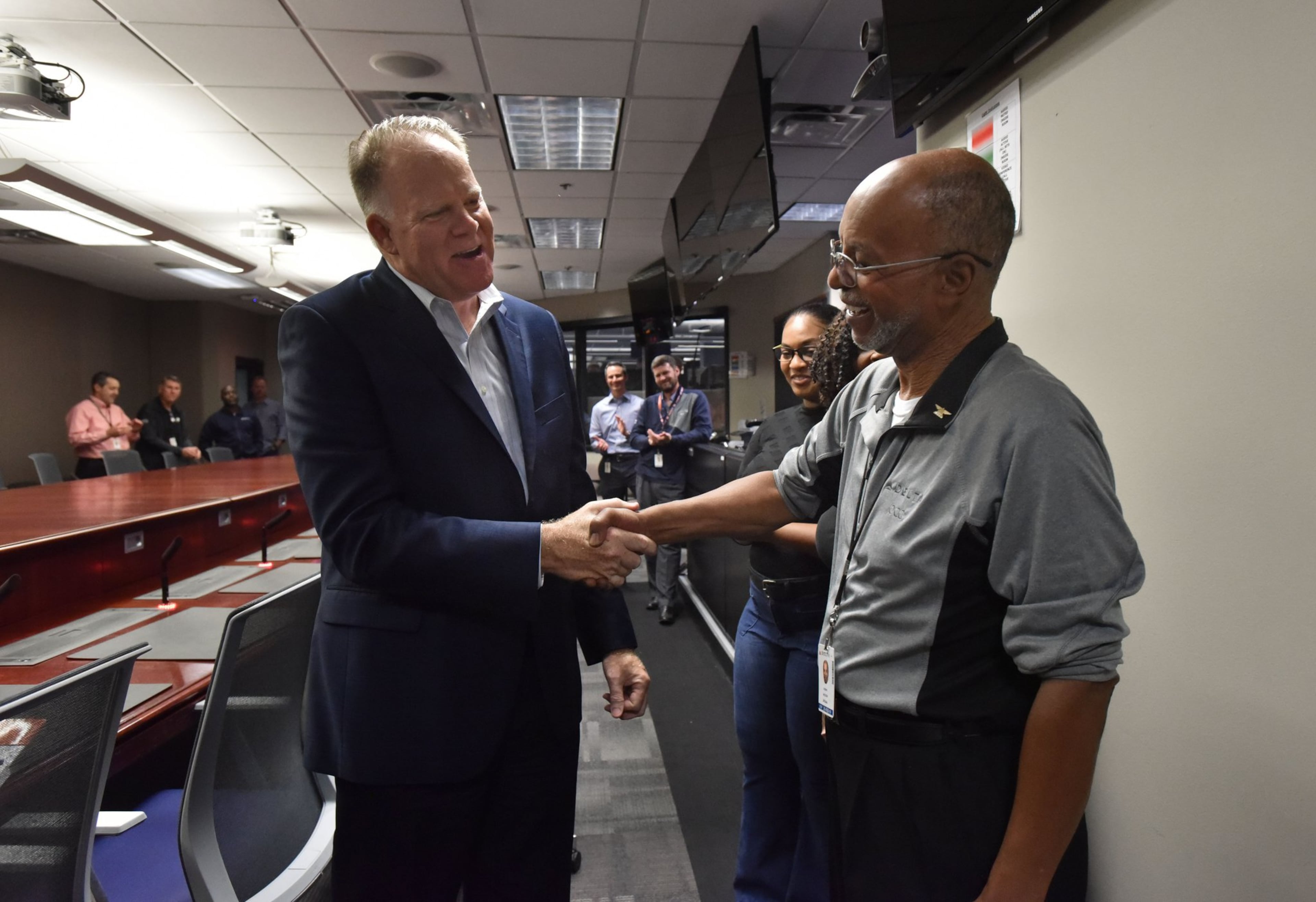Delta’s first black flight dispatcher retires after 50-year career

When Joe Jackson walked into flight control at Delta Air Lines on his first day as an assistant dispatcher in 1980, he noticed something.
“I didn’t see anyone else” who was black, said Jackson, who was 32 at the time. “The first time I came in and I looked around, the only thing I saw was older white men.”
After becoming Delta's first black dispatcher, he went on to become the airline's first black system operations manager and its first black duty director — responsible for managing the carrier's flight operations.
Jackson's remarkable run at Delta started in 1968 when his brother-in-law told him the airline was hiring baggage handlers. It's now coming to a close with his retirement after a 50-year career.
On Thursday, flight control employees and company executives gathered in the airline’s operations control center as Delta chief operating officer Gil West pinned Jackson with a 50-year pin, and colleagues lined up to congratulate him.

He started out working on the ramp at the Miami airport, then became a ticket agent. He was promoted to the role of an elite customer service agent known as a Red Coat and later supervisor. Then he was recruited to join flight control at the company's Atlanta headquarters.
West said Jackson advanced “to the point of running the airline, literally.”
“The duty managers are the quarterbacks,” West said.

Soft-spoken with a calm demeanor, Jackson gained respect in the operations control center for his levelheadedness while handling the complex duty of managing flights for one of the nation's largest airlines.
Functioning as mission control for the airline, dispatchers manage the flight schedule and how it’s affected by weather disruptions or other issues, coordinate with air traffic control, work with pilots to monitor flights and help tackle issues that arise en route.
“Joe would work the (air traffic control) guys like you wouldn’t believe,” said Dave Holtz, senior vice president of operations for Delta.
During ground delays or air traffic control delays, "We can't just up and take off. We have to get permission" from the air traffic control tower, Jackson explained. "You let [the controllers] know that you understand, but 'I have a special flight here that I really, really need help with.'" That might involve explaining that the flight has 10 passengers who could miss important connections and be stuck overnight if the flight is delayed longer.
“If there’s any way at all possible for them to get you airborne, they’ll get you airborne,” he said. “Any kind of a delay, we are working to rectify it, to get that flight moving.”
Holtz said Jackson was a mentor to many younger workers, and that he “always had the ability to adapt to change.”
“He was never afraid of new technology,” Holtz said. “He would always embrace it,” and would often take on the role of a “super-user.”
Jason Tomlin, a 33-year-old dispatcher at Delta, presented Jackson with a trailblazer award, given by Delta's black employees organization. He praised Jackson for breaking the color barrier.
Jackson said he never experienced discrimination as the airline’s first black flight dispatcher. “In fact, in most cases, it seems they went out of their way to help me.”
“I could tell that they had not worked with African Americans or blacks before, because of the stares I got. Not hateful stares, just curiosity-type of stares. And some of the conversations that we had,” Jackson said. “Like, ‘What kind of food do you like to eat?’ You know, ‘Same kind of food you like to eat.’ I think those questions were asked because they didn’t know what to say. And they were just trying to start a conversation.”
Jackson, now 70, will report to work at Delta for the last time on Saturday.
His wife Deborah, who retired in 1999 from the DeKalb police internal affairs department, is accustomed to Joe’s routine of waking at 4 a.m. to prepare for a 12-hour shift.
“He’s always been a hard worker,” said Deborah. “I think he just truly enjoyed it.”
Still, Jackson said he realized earlier this year that it was time to retire.
He and his wife plan to see parts of the country he’s only seen from the sky. “We can take our time since we have time.”



